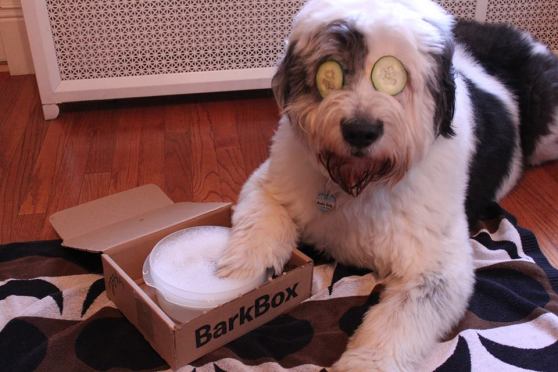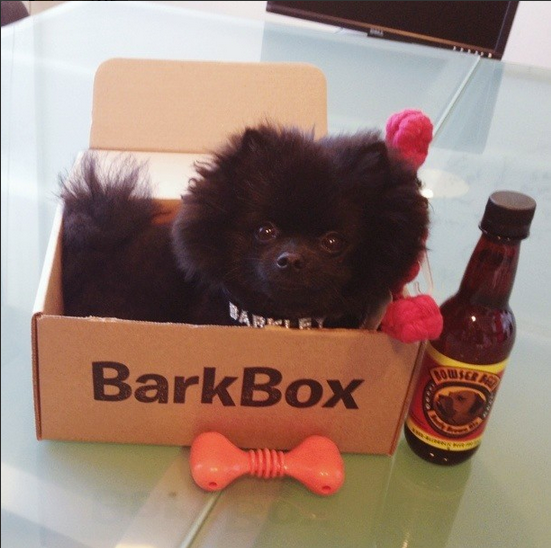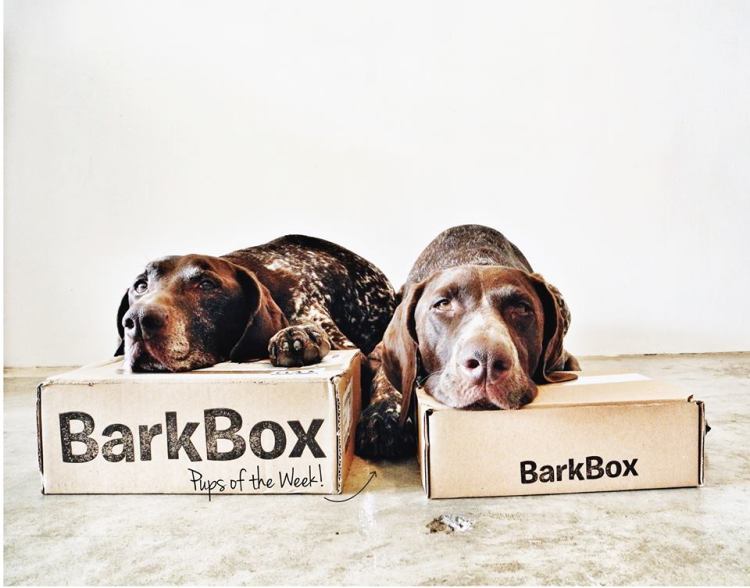What better way to kick off Monday than with news about puppies?
BarkBox, which sends you monthly boxes of goodies for your pooch, is launching a new site called PuppyFeed. This is basically a photo-sharing forum where BarkBox subscribers post photos of their dogs with captions and hashtags, and bond with other users over their shared passion for puppies.
“Every month we get flooded with photos and videos from owners,” said CEO Matt Meeker in an interview with VentureBeat. “We want to harness that excitement. PuppyFeed is giving people a tool to share their dogs with us and each other, and gives them a way to communicate. It is stitching our community together, and tightening those relationships will lead to more customers all around.”
 BarkBox’s core business model is sending subscribers boxes every month with a box of five to seven dog-friendly items. The box is tailored to the size and age of your dog, and you can have it personalized (dogasized?) by answering questions and providing feedback about how various items were received.
BarkBox’s core business model is sending subscribers boxes every month with a box of five to seven dog-friendly items. The box is tailored to the size and age of your dog, and you can have it personalized (dogasized?) by answering questions and providing feedback about how various items were received.
June 5th: The AI Audit in NYC
Join us next week in NYC to engage with top executive leaders, delving into strategies for auditing AI models to ensure fairness, optimal performance, and ethical compliance across diverse organizations. Secure your attendance for this exclusive invite-only event.
BarkBox now has 105,000 customers, and its revenue increased by 10 times this year, according to Meeker.
A key part of BarkBox’s acquisition strategy is the sharing and repurposing of cute dog pictures. The company makes Facebook ads out of them and uses them in e-mail campaigns and Instagram influencer programs. People share the photos around, dog photos catch dog lovers’ eyes, and BarkBox attracts new customers.
The goal of PuppyFeed is to give dog owners a dedicated place where they can unabashedly share dog photos and videos without irritating their Facebook friends (who may not be dog people). Meeker said that creating a community out of its members will inspire existing subscribers to pull in new subscribers. It will also help BarkBox forge and maintain an emotional connection with its users that will keep them loyal.
BarkBox is also in the process of setting up a platform for veterinary home visits.
 “Pet owners have to get into a car, drive to a veterinary, and sit in a crowded room with other dogs,” Meeker said. “It is stressful for you and for the pet. Why can’t a vet come to your house? We’ve learned that there are a ton of vets out there and not nearly enough work for them, so this will act as demand generation for them. It is a similar idea to Uber.”
“Pet owners have to get into a car, drive to a veterinary, and sit in a crowded room with other dogs,” Meeker said. “It is stressful for you and for the pet. Why can’t a vet come to your house? We’ve learned that there are a ton of vets out there and not nearly enough work for them, so this will act as demand generation for them. It is a similar idea to Uber.”
The service will start in January and cost $99 for home visit. People can book an appointment online, and a vet will arrive to perform a 12-point wellness exam. Anything serious or requiring a procedure will still be referred to vet clinics.
Meeker said some vets hold two to three jobs because salaries aren’t enough to pay off hefty student loans. BarkBox would take care of demand generation and provide an easy way for vets to supplement their income, while also allowing clinics to focus on more critical cases and thus better revenue opportunities.
Meeker founded the company in 2011 to address his own need — he had a Great Dane named Hugo and lived in New York City. He describes himself as “an obsessed dog parent” and said he cared deeply about making Hugo happy and healthy, but the options for spilling him were limited.
“There are 45 million households with 80 million dogs in the U.S., and yet the pet industry is still dominated by these very old, non-digital, non-modern brands like Petco and Petsmart,” Meeker said. “The whole landscape has changed, people don’t treat their dogs like pets anymore, they are a family member and these brands haven’t kept up with it.”
 Meeker previously cofounded Meetup, a platform where people with shared interests can form groups, plan meetings, and meet offline. He is active in the New York City tech scene and friends with the founders of Birchbox, who pioneered the monthly subscription model with cosmetic samples.
Meeker previously cofounded Meetup, a platform where people with shared interests can form groups, plan meetings, and meet offline. He is active in the New York City tech scene and friends with the founders of Birchbox, who pioneered the monthly subscription model with cosmetic samples.
Americans spend billions of dollars on their pets every year, and Meeker said some pet owners are craving higher-quality products and willing to spend more money for them.
Small companies are also manufacturing sustainably made toys, high-quality bones, and the like but who struggle to find raise awareness about their brand and distribute to a wide audience without selling through the incumbent retailers.
Birchbox’s success set off a wave of startups offering subscription services for everything from international foods to shoes. The trend really hit its peak in 2012, and some have voiced concern that this model was just another consumer fad, like daily deals, that would quickly lose steam and leave a trail of failing startups in its wake.
Meeker said while this concern may be pertinent for some sectors, this is not the case with pets.
“BarkBox is one of the few products in that whole box-of-the-month kind of thing where you take the box and give it to someone else who now expects it, and they are really, really happy and get this emotional high from it,” Meeker said. “I don’t think you get that same emotional feeling when you get a shampoo sample. Plus pet owners today have nowhere to go, there is not one brand that serves them, and we want to be that brand.”

